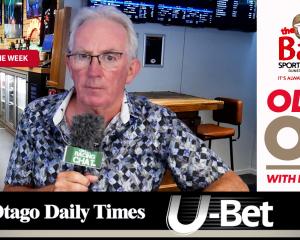Sport Otago chief executive John Brimble really does keep a close eye on our teams.
All he needs to do to see how the Highlanders are shaping up is swivel his chair to the right and look out the window.
If he swings left and leans forward, he can see what is happening over at the Caledonian Ground.
The Logan Park tennis courts are just out the back of his office at the Sargood Centre, and it is a five-minute walk across playing fields to the McMillan Centre hockey turf.
Football South operates from the same building, Forsyth Barr Stadium is across the road, and, with the window open, you can probably hear the appeals from the University Oval cricket ground.
From his privileged position, Brimble also oversees a team of 28 people whose good work largely goes unreported.
There are misconceptions, too.
It is not Sport Otago's role to show up with an oversized cheque when all the chips have been spent, or intervene where it's not wanted.
Remember that line from Jerry Maguire - 'Help me, help you'?
Well, that about sums up what the organisation does.
Sometimes that means waiting on the sidelines a bit too long.
''That is one of the frustrations. Often, we are the ambulance at the bottom of the cliff,'' Brimble said.
''But it is not about us going in there and running the sport. It is about helping the sport run itself.''
When Basketball Otago faced insolvency late last year, Sport Otago was called in to help.
Sport development officer Alan Nicholls put in more than 300 hours of work to help the association wrestle with some significant challenges.
''Often, you are dealing with pretty dire situations and you have to work through that step by step,'' Brimble said.
''The reason a sport gets itself into trouble is usually a combination of poor governance as well as a lack of direction for their administrators. If you use the basketball example, while we could see some of what was happening, we actually couldn't just walk in there and say, `We are going to take over'.
''It had to be a realisation on the part of basketball that they were in trouble and needed help.''
Sport Otago also played a role in helping turn around the fortunes of the Otago Rugby Football Union when it faced liquidation three years ago.
When change manager Jeremy Curragh moved on after a hectic four months of scrambling, Brimble took the ''extraordinary step of seconding ... Richard Kinley''.
''He went in there for six months as an acting manager and we effectively managed the rugby union.
''A lot of people were not aware of that. They didn't need to be aware of that. It was about putting the sport back on its feet.''
Whether the community is fully informed or not, people certainly value Sport Otago.
Its latest stakeholder survey revealed 80% satisfaction, and everybody contacted by the Otago Daily Times spoke of the organisation in glowing terms.
That said, since Sport Otago was founded in 1983, the sports environment has moved from an amateur to a professional era.
It raises the question of whether the overarching organisation is still relevant when most sporting bodies employ their own administrators.
''It is probably as relevant if not more relevant than it was then,'' Brimble responded.
''This is not a negative comment, but we probably have too many people in sport who have moved into administrative roles as a result of being involved in sports for a long period of time and may not have necessarily developed management or administrative skills.
''One of our roles ... is to support those people by building their capabilities.''
Whether too much money is been spent on administration rather than on grass-roots sport is a key debate, though.
Brimble agreed it was important to get the balance right.
''The sports that do well are still the sports that are investing heavily into grass roots. They are also investing into having good management to ensure the people at the grass roots are getting a good quality experience.''
However, some of the sports that might be expected to be doing well have experienced a decline in the past 30 years.
A quick scan of the sports draws in the Otago Daily Times from 1983 reveals just how big the drop-off has been.
Cricket has been particularly hard hit.
There were 60 senior teams in 1983.
Last summer, there were just 33 teams.
Rugby, our national sport, has also experienced a decline during the same period, falling from 84 teams to 56.
Netball has had it even worse. While the competition has been significantly restructured, and it is hard to make a direct comparison, there were 300 teams in 1983.
This year, there are 18 premier teams, 28 senior teams and 109 secondary school teams.
Those statistics will not come as a great surprise.
People have moved away from structured sport and increasingly elect to participate in social or informal leagues.
For example, there are 90 social netball teams in the city, and twilight cricket and touch rugby are also very popular.
People are still participating in team sport; they are just doing it differently.
The other factor is there are just so many more options these days and that has helped lure people away from the big three.
''Certainly, over the last decade, there has been a shift of focus to individual sport,'' Brimble said.
''I'm probably a good example of that, myself. I'm involved in three sports but I don't belong to any club. I go and do it when I feel like it and when it fits into my schedule.
''We actually work with a lot of the new sports. We have a big involvement in the cycle.
''You can't ignore them ... so you embrace them and bring them in as part of the system. But they are different and tend to exist in a more unstructured way.
''You just have to accept that and work with them. When they need something or need to access the planning department of the council or get a resource consent ... you give them some help.''












